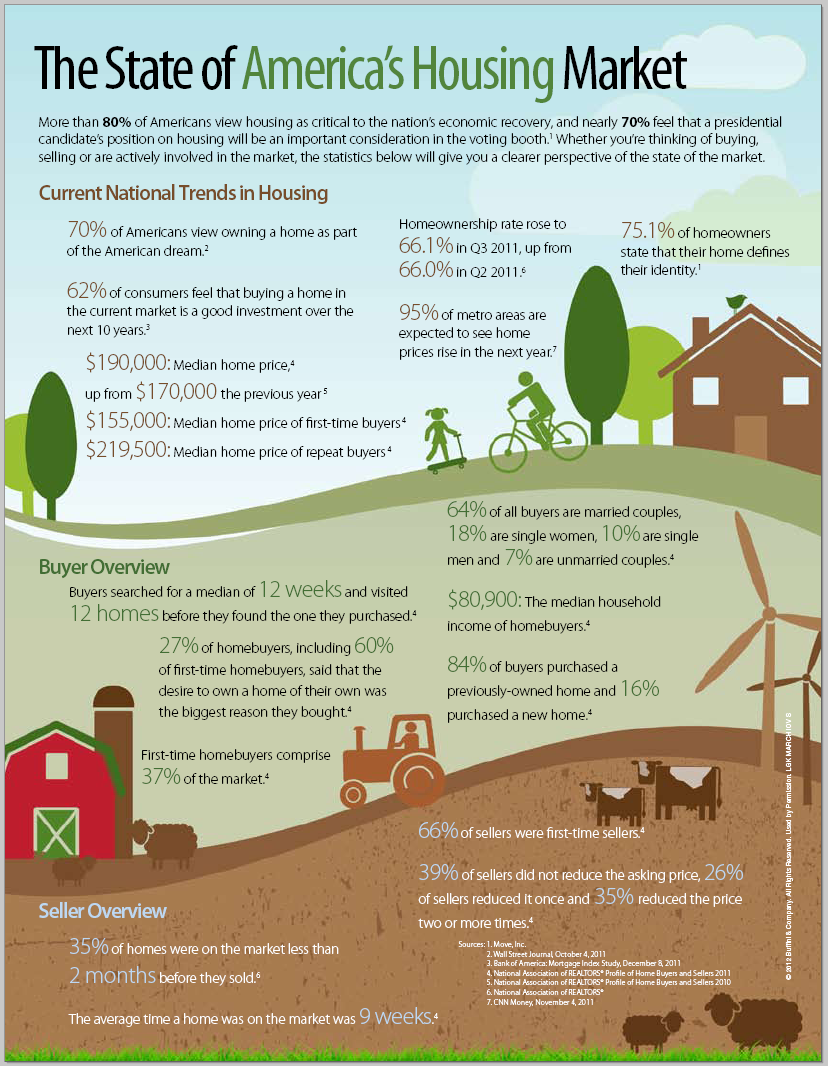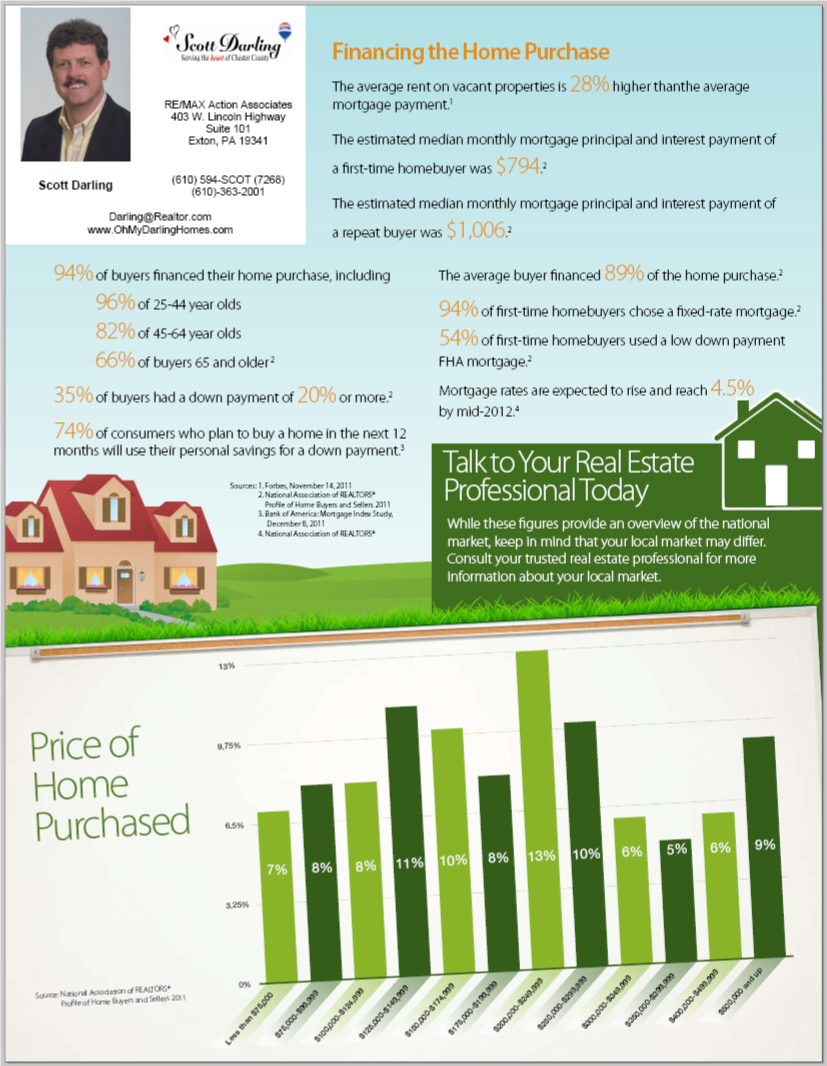This article from Rismedia.com is great news for Chester County PA real estate:
Housing starts will nearly double and home prices will begin to rise in 2013, with prices increasing significantly in 2014.
Those rosy predictions come from a new semi-annual survey of 38 of the nation’s leading real estate economists and analysts by the Urban Land Institute’s Center for Capital Markets and Real Estate. The economists foresee broad improvements for the nation’s economy, real estate capital markets, real estate fundamentals and the housing industry through 2014, including:
• The national average home price is expected to stop declining this year, and then rise by 2 percent in 2013 and by 3.5 percent in 2014.;
• Vacancy rates are expected to drop in a range of between 1.2 and 3.7 percentage points for office, retail, and industrial properties and remain stable at low levels for apartments; while hotel occupancy rates will likely rise;
• Rents are expected to increase for all property types, with 2012 increases ranging from 0.8 percent for retail up to 5.0 percent for apartments.
These strong projections are based on a promising outlook for the overall economy. The survey results show the real gross domestic product (GDP) is expected to rise steadily from 2.5 percent this year to 3 percent in 2013 to 3.2 percent by 2014; the nation’s unemployment rate is expected to fall to 8.0 percent in 2012, 7.5 percent in 2013, and 6.9 percent by 2014; and the number of jobs created is expected to rise from an expected 2 million in 2012 to 2.5 million in 2013 to 2.75 million in 2014.
The improving economy, however, will likely lead to higher inflation and interest rates, which will raise the cost of borrowing for consumers and investors. For 2012, 2013 and 2014, inflation as measured by the Consumer Price Index (CPI) is expected to be 2.4 percent, 2.8 percent and 3.0 percent, respectively; and ten-year treasury rates will rise along with inflation, with a rate of 2.4 percent projected for 2012, 3.1 percent for 2013, and 3.8 percent for 2014.
The survey, conducted during late February and early March, is a consensus view and reflects the median forecast for 26 economic indicators, including property transaction volumes and issuance of commercial mortgage-backed securities; property investment returns, vacancy rates and rents for several property sectors; and housing starts and home prices. Comparisons are made on a year-by-year basis from 2009, when the nation was in the throes of recession, through 2014.
While the ULI Real Estate Consensus Forecast suggests that economic growth will be steady rather than sporadic, it must be viewed within the context of numerous risk factors such as the continuing impact of Europe’s debt crisis; the impact of the upcoming presidential election in the U.S. and major elections overseas; and the complexities of tighter financial regulations in the U.S. and abroad, says ULI Chief Executive Officer Patrick L. Phillips. “While geopolitical and global economic events could change the forecast going forward, what we see in this survey is confidence that the U.S. real estate economy has weathered the brunt of the recent financial storm and is poised for significant improvement over the next three years. These results hold much promise for the real estate industry.”
A slight cooling trend in the apartment sector—the investors’ darling for the past two years—is seen in the survey results, with other property types projected to gain momentum over the next two years. By property type, total returns for institutional quality assets in 2012 are expected to be strongest for apartments, at 12.1 percent; followed by industrial, at 11.5 percent; office, at 10.8 percent; and retail, at 10 percent. By 2014, however, returns are expected to be strongest for office, at 10 percent, and industrial, at 10 percent; followed by apartments at 8.8 percent and retail at 8.5 percent.
The forecast predicts a modest increase in vacancy rates, from 5 percent this year to 5.1 percent in 2013 to 5.3 percent in 2014; and a decrease in rental growth rates, with rents expected to grow by 5 percent this year, and then moderate to a growth rate of 4.0 percent for 2013 and 3.8 percent by 2014. This may be indicative of supply catching up with demand.
For the housing industry, the survey results suggest that 2012 could mark the beginning of a turnaround—albeit a slow one. Single-family housing starts, which have been near record lows over the past three years, are projected to reach 500,000 in 2012, 660,000 in 2013, and 800,000 in 2014. The overhang of foreclosed properties in markets hit hardest by the housing collapse will continue to affect the housing recovery in those markets. However, in general, improved job prospects and strengthening consumer confidence will likely bring buyers back to the housing market.
 of being haunted or are the site of a previous violent crime--and the perception of ghosts and gore is not easy to erase.
of being haunted or are the site of a previous violent crime--and the perception of ghosts and gore is not easy to erase.

 Do your research: It’s important to know what other homes in your area are selling for right now in order to get an idea of a price point for your own property, but you shouldn’t rely on that alone. An Automated Valuation Model, better known as an AVM, is a web-based technology that immediately generates home values based on data analysis of recent area comparable sales, tax assessments and price trends.
Do your research: It’s important to know what other homes in your area are selling for right now in order to get an idea of a price point for your own property, but you shouldn’t rely on that alone. An Automated Valuation Model, better known as an AVM, is a web-based technology that immediately generates home values based on data analysis of recent area comparable sales, tax assessments and price trends.  Generally the problem lies in one of four areas: price, condition, availability, and location.
Generally the problem lies in one of four areas: price, condition, availability, and location.





